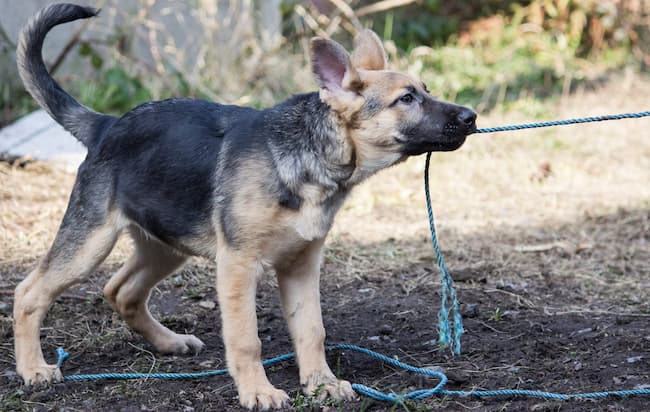German Shepherd 8 Weeks to 8 Months Journey: If you’ve recently welcomed a German Shepherd puppy into your home, congratulations! German Shepherds are a beloved breed known for their intelligence, loyalty, and athleticism. However, raising a German Shepherd puppy can be a lot of work and responsibilities.

In this blog post, we will guide you through the crucial stages of raising a German Shepherd 8 weeks to 8 months. Whether you’re a first-time dog owner or a seasoned pro, we have tips and advice that will help your puppy thrive.
Raising a German Shepherd 8 Weeks to 8 Months
German Shepherds, just like any other dogs, have a few special needs. From 8 weeks to 8 months, your puppy will be undergoing impactful changes in both physical and emotional development. Raising a German Shepherd 8 weeks to 8 months can be a fulfilling experience, but it requires effort, patience, and dedication.
Socialization, training, exercise, and advanced training are the essential aspects of developing a confident, well-behaved, and obedient German Shepherd. Here are some tips to help you through this German Shepherd 8 weeks to 8 months period of growth.
Weeks 8-12: Socialization
Socialization is a critical aspect of a puppy’s development during Weeks 8-12. German Shepherd puppies are highly intelligent and crave social interaction, so expose them to new sights, sounds, and smells to develop their senses and learn about the world around them.

Introduce them to other dogs, people, and experiences so that they become well-adjusted adults. Additionally, use positive reinforcement techniques, such as treats or praise, to train your puppy. Begin the process of housebreaking by taking your puppy outside regularly and using commands such as “outside” or “potty.”
Weeks 12-16: Training
During Weeks 12-16, you’ll begin formal training with your German Shepherd puppy. Start with basic commands such as “sit,” “stay,” or “come.” Use positive reinforcement methods, such as treats or toys, to motivate your puppy and build a loving relationship.
Teach your puppy to walk on a leash to prevent pulling and encourage exercise. Enroll your dog in a puppy class to socialize with other dogs and learn proper behaviors around people and other animals.
Months 4-6: Exercise
German Shepherds are active dogs and thrive with regular exercise. As your puppy grows, increase outdoor time and activity levels. Take your dog for daily walks, play fetch, or let them explore on a hiking trail. At this age, your puppy should begin teething, and you should provide them with dental toys or frozen carrots to chew on and help with pain. Also, maintain good hygiene by grooming your puppy regularly and trimming their nails.

Months 6-8: Advanced Training
As your puppy approaches 8 months, they should have developed basic behaviors such as potty training and obedience commands. Now is the time to advance their training with more advanced commands and activities such as agility training and search and rescue drills. Advanced training will challenge your dog’s physical and mental abilities, helping them stay active and engaged.
What Does a 8 Week Old German Shepherd Look Like?
An 8-week German Shepherd will be considered a puppy and look much different than an adult. The German Shepherd puppy will weigh in from 10-20 pounds, have a soft fur coat, and their size may vary depending on the sex of the puppy.

They will tend to be lively and energetic but may be shy around new people or animals. Their ears will likely still be floppy but may begin to stand up as they reach 8 months. Additionally, they will be learning how to play and explore their environment as they become increasingly dependent on you.
Some More Tips on German Shepherd 8 Weeks To 8 Months Parenting
Here are some tips to help you during the first 8 weeks with your pup:
- Establish a routine: Get your puppy on a daily schedule as soon as possible. Feed them at the same time every day, and take them out for potty breaks on a regular schedule.
- Provide chew toys: Chewing helps your puppy develop strong jaw muscles and helps to relieve teething pain. Provide plenty of chew toys that are specifically designed with puppies in mind.
- Practice crate training: Crate training can help keep your puppy safe when they’re unsupervised and can help with housebreaking.
- Socialize your pup: Take your puppy to meet different people, places, and animals. Exposing them to new people and places helps them become well-adjusted adult dogs.
- Monitor health: Check in with a veterinarian regularly to make sure your puppy is healthy and up-to-date on all necessary vaccinations.
Final Words
That was all about raising a German Shepherd 8 weeks to 8 months. We hope that these tips help you on your journey to raising a healthy, happy German Shepherd! Good luck! Remember to always use positive reinforcement methods and consult with a veterinarian or dog trainer if you have any questions or concerns. If you want to know more about this article, visit our German Shepherdss website. Have a great day!

